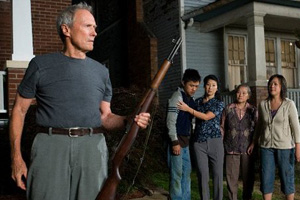CINE-DEBATE: GRAN TORINO – Are You Kidding Me???
I believe the following to be true:
 If Clint Eastwood hadn’t directed or acted in Gran Torino and the role of Walt Kowalski had instead been played by an unknown theater actor from Detroit, and if everything else about the movie had stayed the exact same, not only would Gran Torino not have gotten theatrical distribution, I am 100% confident that it would never have been accepted at an even somewhat major film festival.
If Clint Eastwood hadn’t directed or acted in Gran Torino and the role of Walt Kowalski had instead been played by an unknown theater actor from Detroit, and if everything else about the movie had stayed the exact same, not only would Gran Torino not have gotten theatrical distribution, I am 100% confident that it would never have been accepted at an even somewhat major film festival.
To state my case, allow me to quote from the filmmakers themselves. These choice nuggets are taken from a New York Times article written by Bruce Headlam:
Exhibit A:
The script for “Gran Torino” had been kicking around Hollywood for a while before Mr. Eastwood read it. The writer, Nick Schenk, who worked in a Ford plant years ago, based the character of Walt on the men he met there, many of them Korean War veterans. “I’d talk a lot to these guys, and they’d tell me stuff they wouldn’t tell their wife and kids,” Mr. Schenk said.
Some directors are known as an actor’s best friend. Mr. Eastwood may be the writer’s. “He didn’t change a word,” Mr. Schenk said. “That never happens.”
Exhibit B:
Mr. Eastwood bought the script in February, then shot the movie over the summer at a guerrilla filmmaker’s pace, finishing in 32 days. The fast clip, Mr. Eastwood said, helped him with the Hmong members of the cast, most of whom had never acted and many of whom didn’t speak English. “I’d give them little pointers along the way, Acting 101,” he said. “And I move along at a rate that doesn’t give them too much of a chance to think.”
Apparently, Clint, that rate didn’t give them a chance to act either. Whatever one makes of Eastwood’s characterization of Walt, the never-ending parade of wooden, inexcusable-even-if-this-was-a-student-film performances of his ‘supporting cast’ reeks to me of lazy filmmaking. Eastwood has often appeared to be more concerned with his main players, yet his failure to even try to cast up-to-snuff actors in his less meaty roles tends to magnify the cavernous gap between the two. In the case of Gran Torino, that gap is so cavernous it borders on the avant-garde.
As for the quote in Exhibit A about Eastwood not changing a word of the script, this applies more dramatically to the finished product. Clearly, Eastwood took a script, shot that script, and then edited his picture to that shooting script. And then he called it a picture lock. Which is all well and good if you’re someone like the Coen Brothers. But for most of us—and that includes Clint Eastwood, I’m afraid (at least in this case)—there comes the moment in the editing room when it’s time to make the real movie. When we discover that some performances just didn’t measure up, when harmless jokes now appear to be jarringly racist, when it comes time to kill some babies. Watching Gran Torino, I got the feeling that Clint never had any babies to kill. He sped through production like he was working on an assembly line in a Detroit automotive plant, churning out product and not seeking to find the truth—and credibility—every step of the way. It’s for that reason that the commercial success of Gran Torino bothers me, and it’s why the critical success truly disappoints me.
Somebody, anybody, convince me that I’m wrong (even though I know I’m right).












slickrick
I wanted to like it. Tried to like it. But in the end, what I could not get past was the Eastwood grunting. I love how the grunt was used in every scene and the sound mixer decided to turn it up for emphasis. Strong play.
chibasan
can’t watch any eastwood films after i saw that pile of ass, mystic river.
Yen Tan
I still remember that one scene when the Asian girl was terrorized by some thugs and she had this crazy “I-can’t-believe-I’m-in-a-movie” grin on her face in some of the shots. Nice to know that even with a studio-sized budget, there are still things you can’t fix with a lot of money.
Gelgud
I think you come out of the gate on the wrong foot here, Mike. Saying Gran Torino would be irrelevant to everyone without Clint Eastwood doesn’t make much sense. Would Deconstructing Harry make any sense if it was written by, directed by, and starred someone other than Woody Allen? The movie is the icon, and maybe vice versa. I’m sure there’s plenty of writing about how he’s transplanted the western character to Detroit that’s way better than anything I could say here, but all of it hinges on this being an Eastwood picture. So its relevance depends greatly on the performance and legend-nimbus of its lead actor and direct … so what? It’s fine–great, even–to love things because of who’s involved.
Also, I’d like to see you go after other elements than the performances of the supporting players. Taking shots at shitty performances is beneath you. And I’m sure you, like most readers of this blog, love plenty of movies with wooden performances by non-actors. (Two Lane Blacktop maybe? Anything directed by Paul Morrissey? Most noir films that weren’t directed by A-listers?) And what’s wrong with a cavernous gap that borders on the avant-garde? Sounds great to me.
Anonymous
I hear ya, Mr. Gelgud, but I think my problem is that the whole movie reeks of a rush job, an assembly line production—which everyone involved freely admits to it being. It just feels very SHODDILY made so many steps of the way. Which is fine. But it’s in the context of Clint Eastwood being labeled a “Great Director” or a “Master” that this becomes an issue for me. Does that make any sense? Or are we supposed to just slip into cruise control and not call out a director when they appear to take the road more casually traveled?
Gelgud
I guess I’m having trouble with the fact that you’re taking issue with the film because of what you perceive others perceiving. You’re not really making a case against it (again, don’t we all like some pretty shoddily made movies?) as much as a case against the fact that it’s liked or maybe why you think it’s liked or maybe that appreciations of it aren’t pointing out the things you are about the performances.
I think it’s pushing it to call a movie that’s so slippery with its morality and politics and assembly line creation. Gran Torino for me is like a really unexpected cousin of Do The Right Thing, the way it deals so giddily in racial name-calling and is really funny in the process.
I’m also not sure where I see that it is shoddy to begin with, other than the performances, but I think the accepted platforms for the way we talk about acting and performance is so way off that we’d have to build that argument from the ground up. Did you prefer the Changeling and its professionalism? I didn’t. There is something appealing about watching non-actors stiffly read lines and even seeing them being aware that they’re in a movie (like in Trash Humpers, which I think you agree is one of the best movies of the year). I don’t think you’d disagree with me there, do you?
Gelgud
sorry about the typo above, that should be “an assembly line creation,” not “and.”
Anonymous
Okay, you’re right. I hate arguments when people don’t focus on the film itself and instead worry about its place in some external context, so let me stick to the motion picture. I confess that I, too, laughed my ass off while watching Gran Torino, but it was because 1) I couldn’t believe what I was watching; and 2) that people were seemingly laughing with—and not at—this stubborn ol’ bigot with a slowly melting heart.
I think Clint’s more classic—outright haters would use the term ‘antiquated’ but I wouldn’t—approach to narrative filmmaking places it in a different context than Trash Humpers (though Harmony has been quoted saying he believes he and Eastwood are the most “American” directors, so maybe there’s something to that comparison?). In the case of a fictional narrative multiplex movie, the stilted deliveries and pretty objectively across-the-board BAD performances, especially when contrasted with a trusted presence such as Mr. Eastwood himself, mixed with the metaphors so broad and in-your-face that they tip into the outright offensive, only point out the raging flaws and multiply the feeling of overall ineptitude.
I have to say, I like your comparison, but to me, Gran Torino isn’t an unexpected cousin of Do The Right Thing. It’s a painfully inept cousin of Straw Dogs.
Gelgud
I would like to hear more explanation of what’s offensive. Because it’s not the language, is it?
I’d also like to hear what’s so shoddy about it besides the performances, because I really liked the barren look of the thing, and I don’t think Eastwood’s camera set-ups are disappointing here.
Third, Mike, you keep slipping into using meaningless contexts when you attack this movie. This time you waited until halfway through your second graf, but you used that crutch again, saying that you take exception to GT because of its context as a “multiplex movie.”
Since when was a movie’s distribution format such an important part of determining its qualities? Why does a movie that plays a multiplex have to fit a different standard from one that gets a week-long run at Anthology?
Also, I’m obviously onto something with the Korine comparison, so get rid of the parentheses around that sentence and change the quesiton mark to an exclamation point!
Anonymous
If I may quote a friend here:
“Eastwood is king but that movie was a sloppy, horribly acted, cringy bore.”
I guess that’s what it comes down to for me. Not even sure how to begin breaking it down. Removing the multiplex from the equation, I’d still feel the same way about it.
Spunkyk
I hated him in Bridges of Madison County. He was a wussy Alan Alda
Vern
But don’t you think if you could magically remove Clint from UNFORGIVEN that it would take away some of the meaning there too? I mean it would still be a great movie, but it wouldn’t have the same power as a commentary on his earlier westerns. I know GRAN TORINO wasn’t written for Clint, but that doesn’t change the fact that it plays out as a commentary on the racial politics of the DIRTY HARRY movies and the morality of vigilante movies. It questions some of the conclusions those movies come to and shows where somebody like Harry might’ve ended up.
Also it’s exactly like UP without flying. If you liked UP you have to like GRAN TORINO, that’s the law. And if you hate GRAN TORINO it means you love CRASH. These are proven facts, sorry.
I agree that some of the acting is terrible, but I think Clint’s performance, the weird sense of humor and humanity far outweigh those weaknesses.
Anonymous
I really liked UP. I really didn’t like GRAN TORINO. But you actually raise a good point mentioning UP, because even those cartoon animals had more of a human warmth to them than the stilted characters in Clint’s “real” world. I believed in that cartoon world more than I did the live-action reality of Detroit, which is actually a great way to distinguish between those two.
You know I love you, Vern, but since you bring it up, I would actually say that GRAN TORINO and CRASH would make for an excellent bargain bin 2-pack on a CVS shelf somewhere. That’s what bothers me about it so much. Even though it purports to be commenting on this man and showing that he isn’t actually racist or whatever, the assembly line filmmaking and almost across-the-board bad acting turns these people into CRASH-like caricatures as opposed to fully realized figures.
Your point about UNFORGIVEN is well taken.
That said, y’all should read Vern’s review if you haven’t already: http://outlawvern.com/2008/12/31/gran-torino/
Josephfort
You love Josh Safdie and Lena Dunham and hipster stuff. So of course you do not get Clint Eastwood. That is not a surprise.
Anonymous
Good one, Josephfort. I actually get Clint Eastwood very much. In love with A PERFECT WORLD and LETTERS FROM IWO JIMA just to name two. In this case, it’s the movie not the man.
Anonymous
Good one, Josephfort. I actually get Clint Eastwood very much. In love with A PERFECT WORLD and LETTERS FROM IWO JIMA just to name two. In this case, it’s the movie not the man.
Teru Kei
Well I stand by my opinion that this film is really just a comic masterpiece falsely marketed as a riveting piece of racial disparity in the economically ravaged Midwest city of Detroit..
MichaelTully
Best take on this I’ve heard yet.
Andrew Stibor
“not only would Gran Torino not have gotten theatrical distribution, I am 100% confident that it would never have been accepted at an even somewhat major film festival.”
you obviously haven’t been to many film festivals or only watch the featured selections.